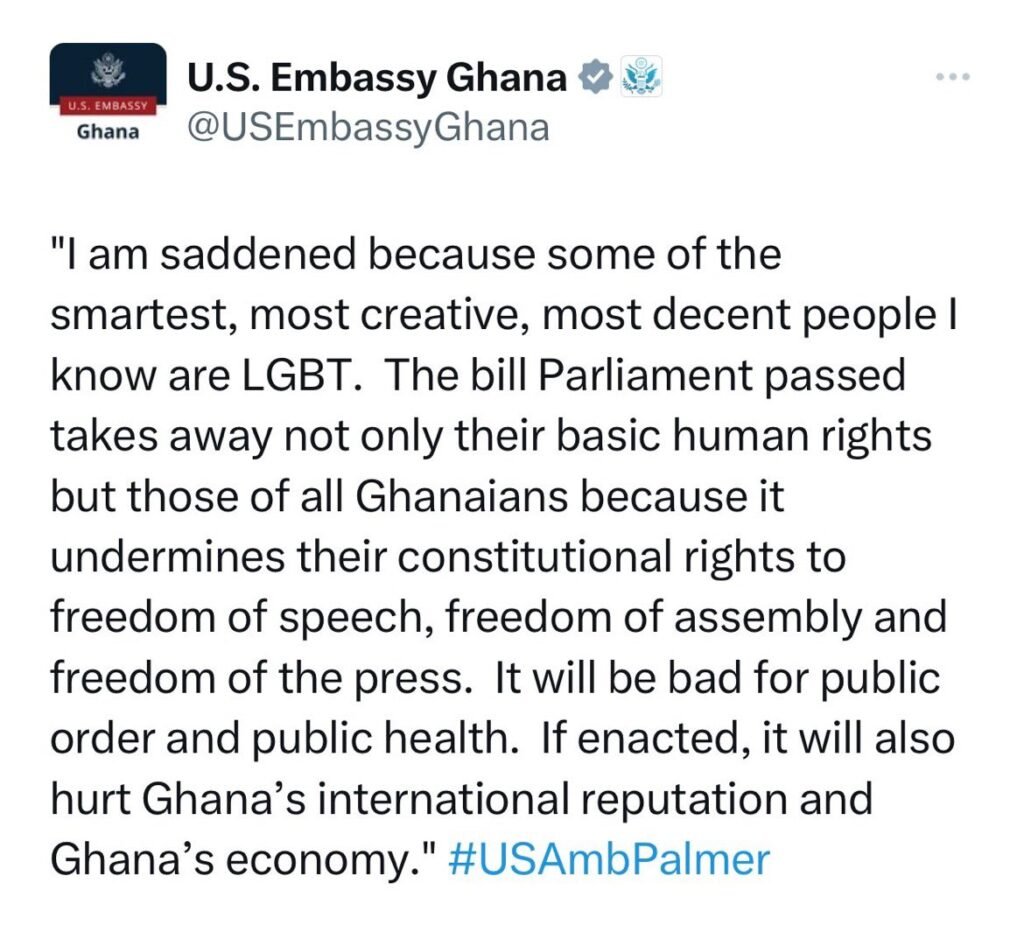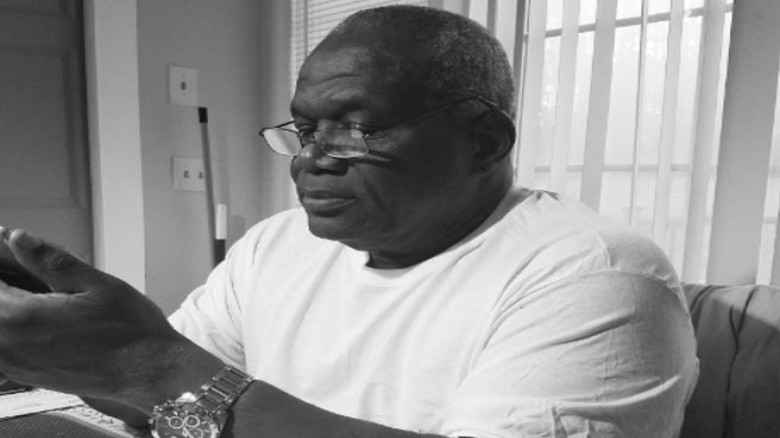LGBT: US Ambassador condemns bill passage
The passage of Ghana’s Promotion of Proper Human Sexual Rights and Ghanaian Family Values Bill, also known as the anti-LGBTQ bill, has sparked strong reactions both domestically and internationally.
U.S. Ambassador to Ghana, Virginia Palmer, expressed deep sadness over the bill’s passage, highlighting the impact it will have on the rights of LGBTQ individuals, whom she believes are one of the smartest and decent people, and all Ghanaians.
She emphasized that the bill not only infringes upon basic human rights but also undermines constitutional freedoms such as freedom of speech, assembly, and the press.
Palmer warned of the negative implications the bill could have on public order, public health, Ghana’s international reputation, and its economy.
“I am saddened because some of the smartest, most creative, most decent people I know are LGBT. The bill Parliament passed takes away not only their basic human rights but those of all Ghanaians because it undermines their constitutional rights to freedom of speech, freedom of assembly and freedom of the press. It will be bad for public order and public health. If enacted, it will also hurt Ghana’s international reputation and Ghana’s economy.”

The bill, which aims to criminalize LGBTQ activities in Ghana, proposes strict penalties, including imprisonment, for individuals engaged in such activities and LGBTQ advocacy.
It also seeks to prohibit the promotion of LGBTQ rights, organizations, and events in the country. Despite efforts by some members of Parliament to amend the bill citing human rights concerns, the bill ultimately passed after a contentious session.
Majority Leader Alexander Afenyo-Markin’s attempts to make amendments during the second consideration stage were rejected by the Minority, leading to the Speaker pushing for the third consideration stage, where the bill was passed with a voice vote.
Now, the bill awaits President Akufo-Addo’s assent to become law. Prior to its passage, there were several amendments made to the bill, including setting a minimum custodial sentence of three years and a maximum of five years for promoters and sympathizers.
Individuals caught directly engaging in LGBTQ activities will face a minimum sentence of six months, extendable to a maximum of three years.
tigpost.co
The passage of Ghana’s Promotion of Proper Human Sexual Rights and Ghanaian Family Values Bill, also known as the anti-LGBTQ bill, has sparked strong reactions both domestically and internationally.
U.S. Ambassador to Ghana, Virginia Palmer, expressed deep sadness over the bill’s passage, highlighting the impact it will have on the rights of LGBTQ individuals, whom she believes are one of the smartest and decent people, and all Ghanaians.
She emphasized that the bill not only infringes upon basic human rights but also undermines constitutional freedoms such as freedom of speech, assembly, and the press.
Palmer warned of the negative implications the bill could have on public order, public health, Ghana’s international reputation, and its economy.
“I am saddened because some of the smartest, most creative, most decent people I know are LGBT. The bill Parliament passed takes away not only their basic human rights but those of all Ghanaians because it undermines their constitutional rights to freedom of speech, freedom of assembly and freedom of the press. It will be bad for public order and public health. If enacted, it will also hurt Ghana’s international reputation and Ghana’s economy.”

The bill, which aims to criminalize LGBTQ activities in Ghana, proposes strict penalties, including imprisonment, for individuals engaged in such activities and LGBTQ advocacy.
It also seeks to prohibit the promotion of LGBTQ rights, organizations, and events in the country. Despite efforts by some members of Parliament to amend the bill citing human rights concerns, the bill ultimately passed after a contentious session.
Majority Leader Alexander Afenyo-Markin’s attempts to make amendments during the second consideration stage were rejected by the Minority, leading to the Speaker pushing for the third consideration stage, where the bill was passed with a voice vote.
Now, the bill awaits President Akufo-Addo’s assent to become law. Prior to its passage, there were several amendments made to the bill, including setting a minimum custodial sentence of three years and a maximum of five years for promoters and sympathizers.
Individuals caught directly engaging in LGBTQ activities will face a minimum sentence of six months, extendable to a maximum of three years.
tigpost.co











Leave A Comment